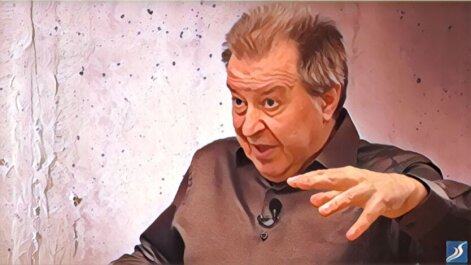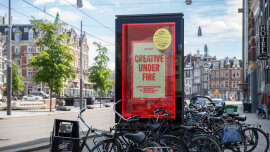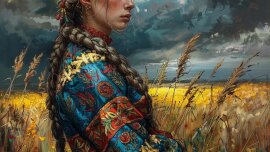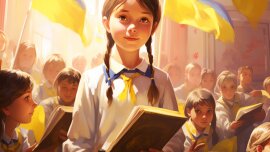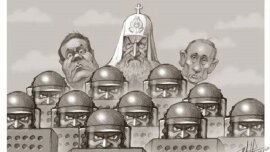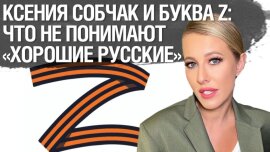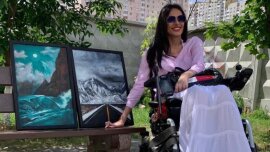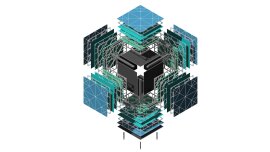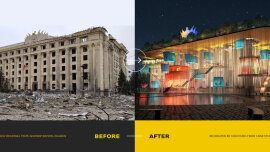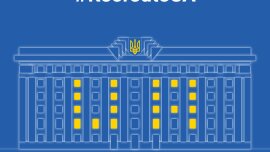In order to discuss the "Ukraine Project", we need to agree on what Ukraine is.
We are not in a common design position, because in our society, the optics of such a design are different. We have not yet agreed on what exactly we should design.
Theoretical prerequisites for the design of Ukraine
We do not have solidary answers to two questions.
Why should Ukrainians be together? What is Ukraine?
Should we answer these questions right now? I think it's worth it, because whoever doesn't know himself, doesn't know his limitations and capabilities, he can't defeat the enemy.
While preparing for the report in Poltava, I read the report of Professor Yaroslav Hrytsak, delivered at the "Sustainability: UA" conference on April 24, 2023..
I liked this report in its main historical assessments and was disappointed in its meaningful and perspective visions.
Yaroslav Hrytsak gives only one answer to both questions.
Ukraine is a nation, and we must be together to preserve the nation.
Yaroslav Hrytsak makes a good start by distinguishing between a people and a nation. And it is well said that people always survive. But when it comes to the nation, he continues to speak of the people, but with institutions. This is very strange and contradicts his previous speeches, where he talks about the elite, modernization and various changes.
People survive. A nation is changing and developing.
No matter how strange it sounds, Hrytsak is a populist here, and I am a nationalist. Or at least, a bigger nationalist than Hrytsak. Europe forces us to be a nation, pushing us to reforms and all kinds of institutions, but we resist and try to be a people.
If you read Hrytsak, it turns out that Ukraine should be a nation with institutions. That is, it is institutional formalism, because Yaroslav Hrytsak does not say anything about changes.
Yaroslav Hrytsak says that there were three periods in Ukrainian history when Ukraine almost did not exist. This is the end of the 18th century after the liquidation of the Cossacks. This has been since 1850, after the Valuev decree. This is the end of the 1970s - the beginning of the 1980s. But Ukraine kind of survived.
So what is the survival of Ukraine? What exactly survived throughout the history of Ukraine?
The Ukrainian language survived in the village, literature in the capital, intellectual centers in the diaspora. That is, the people survived, because the quasi-elite did not actually generate the concept of change.
Thinking, philosophy, engineering, intellectualism did not survive, because they were never a structural tradition in Ukraine. That is, the nation did not survive.
In any society, there are two boundary conditions: existential (how to be) and transitional (how to change).
The existential condition of the socialization of beings can be expressed in the permanence of the genus, clan, people, nation, civilization, humanity. Ukraine can have a separate essence, meaning and perspective only when it is capable of self-survival.
If, in order to win the war, Ukraine critically needs foreign bairaktars, highmars, patriots, F-16, etc., then this means that Ukraine is not a separate entity, that is, Ukraine as a nation is part of something else, which actually and ensures its survival.
The transitory condition of the socialization of beings can be expressed as changes in a certain space, territory, and time. Ukraine can preserve the durability of its name, history, and continuity only when it can change independently, responding to the new challenges of the times.
If in order to change, Ukraine as a nation needs external forces or conditions (UKR, Poland, Russia, Austria-Hungary, USSR, Europe, USA), then it is under the control of that external force that ensures its changes.
Hrytsak believes that the survival of the people is best ensured by the survival of the nation, because it ensures change. But this is not so, because the nation itself in Ukraine is understood in an extremely simplified way - as only linguistic and cultural changes, that is, motivations, transcendences, thinking about beginnings, boundaries, orientations are not included here.
It was very funny to read in Yaroslav Hrytsak's report about Galician platsky and Lviv-style chocolate, which are moving around Ukraine. Such reasoning in peacetime could even be interesting. But now? During the war? Shall we knock down rockets with balls and chocolate?
Ukraine needs such a society that produces tanks, ships, missiles, planes, anti-missile defense, anti-aircraft defense, etc. And it is definitely not a nation. Nations cannot long exist alongside empires. They either become civilizations (at least empires, if they can't do otherwise), unite into civilizations, reach the scale of the entire humanity, or collapse.
For me, Ukraine as a nation is not just an institutional capacity for modernization. For me, Ukraine is interesting as a critical mass of microgroups of thinking people (this is not a creative class, namely intellectuals - philosophers, scientists, engineers, doctors, teachers, etc.), organizations of people of will (this is not only the Cossacks, but also politicians and businessmen ), groups of people of faith (these are not only churches, but also theologians, non-church centers of various faiths, mystical practitioners, visionaries and fictionists), clubs of artists and writers (these are not only writers and poets, but various artistic, aesthetic and psychological practices), which allow us to accept the challenges of the era and respond to them.
That is, I propose to go further than the nation, I propose the civilizational dimension of Ukraine - the structure of motivations, transcendences, the presence of microgroups of thinking, legitimate and in demand in a thinking society. And only on the basis of microgroups - the creation of social institutions that are less durable in history and less significant than it seems to institutionalists.
There is no such Ukraine even today.
I am more than a populist, more than a nationalist of Ukraine. I am a civilizationist of Ukraine.
Today, Ukraine is an incomplete nation, as it is an unchanging linguistic and cultural community, in the sense that it does not modernize, as it lacks a thinking society.
A thinking society is not one where everyone thinks, but where there is room for thinking-changes.
Ukraine was constantly out of step with the times in all periods of its existence. After all, there was no one to interpret the zeitgeist. The corresponding thought structures were not their own and could not even be borrowed, because there was no one to place them on.
Cultural prerequisites: the myth of Ukraine
Therefore, today I will talk about the prerequisites of design. In particular, about cultural and civilizational prerequisites.
Yaroslav Hrytsak says:
"...Every person in every society needs a myth. Without a myth, no one can live, no society. Without a myth, we all turn into such self-centered, selfish people who do not have a common goal, nothing glues us together. Myths are what we are glued together. Myth is not about creating some convenient truth. Myth is about what makes us great, what makes us feel that we are bigger than we really are, that we have some special mission."
What happened to Ukrainians in general, that they are socialized by myths, and not by religions, and even more so, not by philosophical concepts combined with scientific theories?
Myths are characteristic of the people. Nations are still guided by ideologies, largely philosophical and scientific.
But, less so. Do you want a myth on which Ukraine was founded? I will show it to you.
ˑ
In 1827, an event took place in Ukraine that significantly influenced its fate and its subsequent history.
You and I all know about this event because we studied at school.
Don't you remember the poem by Taras Shevchenko (1814-1861) "It's been my thirteenth..."?
It is the spring of 1827.
What is happening in this poem?
ˑ
Little Shevchenko herds lambs outside the village, prays and experiences a mystical experience. He himself testifies that he was then in a changed transcendental state:
"Did the sun shine like that,
Did something happen to me like that?
I felt so loved, loved,
As if in a god..."
ˑ
In this changed state, a vision comes to him:
"Like I woke up, I look:
the village has turned black,
God's sky is turning blue
And it has gone to waste.
I looked at the lambs -
Not my lambs!
I turned to the house -
I don't have a house!
God did not give me anything!...
And tears flowed..."
From the point of view of psychoanalysis, this is a description of God's refusal of a prayer appeal. That is, little Taras experiences the realization of being abandoned by God and cries.
His crying is observed by a girl who approaches him, comforts him , wipes away his tears, and then the two of them drive "other people's lambs to the water".
Shevchenko wrote this poem in the second half of 1847, in the Orsk fortress, where he realized in a fully grown-up way that it was from that moment that his hatred began. After 175
( 195) years, I will call it resentment, as the main pathic foundation of Ukrainian will, history and the current war between Russia and Ukraine. 1827 is the year of birth of national resentment in Ukraine. Soon there will be 200 years of resentment.
"...Nonsense!... And even now, as I remember,
that heart cries and hurts,
Why didn't the Lord let him live to
a young age in that paradise.
He would have died, plowing in the field,
He would not have known anything in the world.
He would not have been a fool in the world.
I didn't curse people or God!"
Shevchenko regrets that he did not live to live in that paradise. Because he understands that it is from that moment that anger is born, hatred for his fate, which leads to the curse of God and people.
Shevchenko clearly formulates his bloody resentment in his "Testament" (1845):
"As it will be carried from Ukraine
to the blue sea
The blood of the enemy... I will leave
the fields and the mountains -
I will leave everything and go
to God himself
to pray... and before that
I do not know God.
Bury and get up,
break the shackles
and
sprinkle Will with the enemy's evil blood."
It is precisely Shevchenko's realization of the mystical experience of ending relations with God, where the condition for continuing Shevchenko's relations with Him is the restoration of God's justice towards Ukraine through bloody revenge against the enemies, that makes Shevchenko a Ukrainian prophet. It is the "Testament" that formulates the main prerequisite for the survival of Ukrainians: "transmit from generation to generation hatred of enemies and prepare to kill them."
Please note that the "Testament" was written two years before "I've passed the thirteenth..." Evidently, Shevchenko wanted to find the origins of his mood and his appeals in the "Testament", and found them in the mystical experience of his youth.
This is how Shevchenko becomes a prophet of resentment in Ukraine.
That is, the Ukrainian myth has a clear symbolic structure: prayer – rejection of God – anger at God’s rejection – curse of God and people – construction of enemies, whose blood will atone for this rejection and restore faith in God – description of war with enemies in the form of a "Testament" as an intention, which should be passed down from generation to generation.
In his "Testament" Shevchenko puts forward an ultimatum to God: only on condition of enemy blood in the sea will he recognize God again.
Rejecting God, because he did not give him lambs or a house, and blaming the enemy is a classic resentment with transference of guilt and substitution.
How can you be a Christian and a supporter of the Shevchenko myth at the same time? How do Ukrainians think of it?
Very easy. Shevchenko advised them not to think, because thinking is a disaster, and thoughts are orphans that no one needs ("My thoughts, my thoughts").
Do you like this myth? Do not like? But this is our Ukrainian myth. We just don't want to notice it. We mostly go for any slyness, relativism or fanatical denial of the type "otherwise it was impossible to stand".
As long as Ukrainian schoolchildren will study at the "Testament" school, Ukrainians will be doomed to resentment, periodic wars, and ruins.
It is from this resentment that the patience of Lesya Ukrainka and the rebellion of Ivan Franko, the concept of Dontsov's will and the entire philological independence of Ukraine in 1991 emerge.
Cultural prerequisites: blurring of resentment
Shevchenko's world is rather gloomy: crying, hatred, curses. This is the world of Shevchenko's mystical relationship with God, where faith in God is a hostage to Ukraine's will.
In Shevchenko's world, I have no freedom at all, because every Ukrainian is doomed to misery. In this world, many generations of Ukrainians are forced to destroy the Russian empire at the cost of resentment and a large number of their victims. And for this purpose, God is held hostage, thinking is neglected, faith is blasphemed, passion is perverted, the will is one-sidedly strained.
From a pagan esoteric point of view, Shevchenko bequeathed us not a good mission, but a bloody spell for war. The initiation of national resentment in the childhood of Ukrainians is an entry into the space of a curse. If someone resists it, the spell acts as a curse.
In this sense, the myth of Shevchenko is much more powerful than nationalism, because it appeals to transcendental quasi-civilizational principles, albeit through a bloody spell.
Franko's world is no longer so bleak, because he intellectually rethinks Shevchenko's resentment, developing the metaphor of Sisyphus' labor: the gods cursed Sisyphus to forever lift a stone up a mountain, so that it would then roll down. In the poem "Masons" (1878), the rock that the masons pound is finite, and there is a prospect that "people will follow this road until then."
Lesya Ukrainka's world is even more positive, because she teaches us to replace negative emotions with positive ones, to hope without hope, although she also uses the metaphor of Sisyphean labor in the poem "Contra spem spero!" (1890).
I was very excited by the poem "The Stonemasons" as a child. He became and was a program for me until I was 29 years old. And then I rethought it in simple metaphorical ideas: why not use rock-breaking machines or maybe dynamite? True, this requires thinking, a different will, a different faith, a different passion. That's how I got out of Frank's world, because, I remember, I never wanted to live in Shevchenko's world. I even liked Lesya Ukrainka's world more, because it was usually brought to the mother's Ukrainian family.
Poetry very well reflects changes in the mental states of Ukrainians in relation to Ukraine. Almost until the end of the 20th century, there was folk poetry in Ukraine. National poetry began to be composed only in the times of independence - it can be identified in the list of Bu-Ba-Bu poets and the Bu-Ba-bu Academy . But by and large, national Ukrainian poetry has not yet taken place. Because so far in Ukrainian poetry there is not enough about changes, about development, about the future, there is no intellectualism and thinking, there is no imaginative imagination.
Cultural prerequisites: poetic strategies of Ukraine
Yaroslav Hrytsak further says:
"...When you see this list of events, you understand that the national stability of Ukrainians is even higher than the stability of Ukrainians as a people.
Why? Because there is always someone among those gardeners who represent a different ethics, or, one might say, aesthetics or metaphysics. At each of these moments, someone appears who, according to Frank, decides "to go against the grain, against the tide." Simplifying out of necessity: there are always people who do not pay attention to the supposedly objective state of history, but start developing their projects that go against history. Very conventionally speaking, they are Taras Shevchenko in the first case, when Cossack Ukraine disappeared; Franco - in the second case, when Ukraine disappeared in Galicia; and Vasyl Stus – in the third. We usually use the names of national poets, because they are the most symbolic. These are the figures of the first row, and behind them are thousands of lesser-known ones."
Good.
I also believe that a poet for Ukraine is more than a poet. Actually, just like in Russia, but that's how it is. Because a poet in Ukraine is, first of all, a prophet.
You can argue - poems or songs are more important to the people, but let there be poems. They can be explored more quickly.
I took the most famous Ukrainian poems from the first two links in a Google search for "the best Ukrainian poems", that is, here and here . In addition, I have added several equally well-known quotes in addition to this selection. These poets have many other poems, but these are the ones that became famous. I assumed that these poems became most famous precisely because they contain prophetic strategic memes that people actually liked the most. Let's see what these memes are.
ˑ
"I look at the sky - I think the same thought:
Why am I not a falcon, why do I not fly?
Why didn't you give me wings, God?
I would leave the earth and fly to the sky..."
[Quotation, 1841, Mykhailo Petrenko, out of the sample, (1817-1862) ]
The strategic problem is that man does not fly, because he does not have wings.
ˑ
Lina Kostenko objects:
"A man supposedly does not fly ...
And it has wings. And he has wings!" [Quotation, 1958, Lina Kostenko, out of the sample , born
in 1930]
The strategic problem is that man does not fly, even though he has wings . Deer and mountains - I will leave everything and go to God himself to pray... and besides, I don't know God. Bury and rise
Break the shackles
and sprinkle Will with
the enemy's evil blood."
[Quotation, 1845, Taras Shevchenko (1814-1861) ]
Strategy - pass this hatred from generation to generation, until the blood of the enemy flows into the blue sea.
ˑ
"Cry, children Cossacks, -
Such is your fate!"
[Quotation, "Night of Taras", 1840, out of selection, Taras Shevchenko (1814-1861) ] The
strategy is to cry, i.e. to charge with the negative energy of resentment in order to continue to hate and wish for enemy blood.
ˑ
"Thoughts my thoughts, my thoughts,
Woe to me with you!"
(Thoughts are orphans whom he drives to Ukraine, maybe they will find truth and glory there)
[Quotation, 1839, Taras Shevchenko (1814-1861) ]
ˑ
"Go away, thoughts, you autumn clouds!
...
I want to live! Go away, sad thoughts!"
[Quote "Contra spem spero (I hope without hope)", 1890, Lesya Ukrainka (1871-1913) ] The
strategy is not to think, because it makes me sad and hard on my soul.
ˑ
"I was a little proud
And I was not afraid of anything.
Although the pain reached my heart,
In order not to cry, I laughed..."
[Reconstruction of quotes, 1897, Lesya Ukrainka (1871-1913) ]
Strategy - patience in laughter through tears.
ˑ "I will be a heavy stone
on a steep flint mountain
will lift
And, carrying that terrible weight,
I will sing a cheerful song."
[Quotation "Contra spem spero (I hope without hope)", 1890, Lesya Ukrainka (1871-1913) ]
The strategy is to perform Sisyphean labor and also with a song, that is, to hope without hope.
ˑ
"Endure, endure - patience will polish you,
your spirit will steel - so endure, endure..."
[Quotation, publ. 1986, Volodymyr Stus (1938-1985) ]
The strategy is to endure, because it strengthens the spirit.
ˑ
"Eternal revolutionary -
Spirit that tears the body for battle,
Tears for progress, happiness and will..."
[Quote, 1880, Ivan Franko (1856-1916) ]
Strategy - revolution as a spiritual action for will (freedom).
ˑ
"There is open devastation in the room of the spirit..."
[Quotation, 1991, Yuriy Andruhovich (b. 1960) ]
Actually a fixation of what such a strategy of the spirit leads to.
ˑ
"And a strong voice from above us, like thunder, rumbles:
"Peel this rock! Let neither heat nor cold
stop you! Endure both toil, thirst, and hunger,
Because you are destined to break the rock in one sitting."..."
[Quotation from "The Stonemasons", 1878, Ivan Franko 1916) ] The strategy is cyclic willful actions: " to bang against a stone
forehead again and again" . No, we are slaves, although we voluntarily took the bond upon ourselves. We have become slaves of will: On the path of progress, we are only stonemasons. [Quote from "The Stonemasons", 1878, Ivan Ffranko (1856-1916) ] The strategy is to be slaves of the will (will, not freedom). ˑ "I affirm, I affirm, because I live..." [Quotation, 1943,
The strategy is an existential affirmation (after the turning point in the Second World War, when there was still some optimism that now everything will be different in Ukraine).
ˑ
"Today everything is for you -
Lakes, groves, steppes.
And you have to hurry to live,
You have to hurry to love -
Look, don't fall asleep!
ˑ
Because you are a person on earth,
And whether you want it or not -
Your smile is the only one,
Your pain is the only one ,
Your eyes are alone..."
[Quotation, 1962, Vasyl Symonenko (1935-1963) ]
The strategy is to be human, to hurry to live.
ˑ
"How good it is that I am not afraid of death
and do not ask if my cross is heavy.
That to you, God, I do not bow low
in anticipation of unknown layers.
That he lived-loved and did not accumulate filth,
hatred, curse, remorse.
My people, I will return to you again,
and in death I will turn to life
with my suffering and not evil face,
like a son, I will worship you to the ground
and honestly look into your honest eyes,
and I will wash myself with honest tears."
[Quotation, 1972, Volodymyr Stus (1938) -1985) ]
The strategy is not to be afraid of death, to accept posthumous recognition as a continuation of life.
ˑ
"Love Ukraine in dreams and waking life,
your cherry Ukraine,
its beauty, eternally alive and new,
and its nightingale language."
[Quotation, 1944 , Volodymyr Sosyura (1898-1965) ]
The strategy is to love Ukraine and its nightingale language. The most understandable and most popular pseudo-strategy. This is the strategy of the so-called professional patriots.
ˑ
"Swim, fish, swim -
here are your islands,
here is your grass,
here is your stubble:
rules your route,
sews a parachute for you,
feeds you in the depths
with its stubble..."
[Quote, 2013, Serhiy Zhadan, 1974]
Modern opportunistic fashion strategy – sailing in everyday life, where it is not clear who and what controls, but where there is a route, safety equipment (parachute), etc.
ˑ
There is nothing here about thinking, nor about the complexity of the social model, nor about solidarity, nor about a contract, nor about an unbridled imagination, nor about a long-term vision of Ukraine. There is none of that.
Let's briefly record the poetic stratagems.
...We don't have wings. You have to cry. You have to endure. It is necessary to engage in Sisyphean labor, even if it is to peel a large rock. It is necessary to rise up. We must assert ourselves, go with the flow, love Ukraine and its language. You can live and die in a hurry. It is impossible to think...
This research confirms a little bit of what Yaroslav Hrytsak says. Such strategies allowed Ukraine to survive as a people, but not as a nation, because there is no change, no modernization, no new projects, no visions of the future.
So, do we like such strategies in Ukrainian poetry now? Do you really think that Ukrainians should live by these strategies of poets?
Ukrainians, parents of children, grandparents of grandchildren, it is better not to let children read Ukrainian poetry without psychoanalytical criticism, if you do not want Ukraine to find itself again with mass victims and in ruins. Let children read philosophers better or give them translations of Western poets. Because Ukrainian poetry programs Ukrainians only for death, and Ukraine for ruin.
Maybe such poetry was needed before Shevchenko's "Testament" came true. But now how? Already a sea of enemy blood, Shevchenko's soul is about to fly to pray to God. And we are still resentful about the nation.
Ukraine as a nation
Yaroslav Hrytsak says: "The encouraging thing in this story is the resilience of Ukrainians and Ukraine. This is an experience that must be studied. When I am asked about the reasons for resilience, my first and honest answer is: I don't know, because there is a lot of metaphysical stuff in it, which is not amenable to rational explanation."
A little further, Yaroslav Hrytsak says:
"The closest to me here is the explanation of Benedict Anderson, a famous theoretician who, by the way, was a Marxist by profession - and it is interesting that it was he, a Marxist, who wrote the most positively and emotionally about nationalism. He said, that there is a very common stereotype, as if nationalism is about hatred for others. And he convinces: no, nationalism is very important, because it is about love for someone, for your neighbor, it is the maximum emotion that pushes you to great empathy, to self-sacrifice ."
Let's try to put forward a hypothesis as to how the stability of Ukrainians is arranged, because I don't like the answer from the scientist Yaroslav Hrytsak at all.
There are several ideas about nationalism. They are manipulative because they constantly have different guidelines, but all under the common word "nationalism".
It is believed that political nationalism is more general than ethnic. But Levko Lukyanenko came up with a way to erase the border between them. "Political nationalism is ethnic nationalism that has gained political power." This definition does not contradict any of the understandings of nationalism, but exposes its manipulative nature.
In contrast, I will define nationalism from real politics.
In order to survive, Ukraine and Ukrainians created a special survival structure - nationalism and nationalists. This is not expansionist Nazism, this is precisely the nationalism of the survival of the nation.
For this, the nationalists had to create an order or a corporation of nationalists, which was actually almost professionally engaged in the survival of Ukraine.
The creation of such a structure performed the necessary functions for the preservation of Ukraine. But was the price or those restrictions of freedom that this structure forcibly spread in Ukraine always acceptable?
Since Benedict Anderson says that a nation is "an imagined community," then in the corporatized imagination the nation includes only those who imagine themselves to be a nation or who control such imaginings. If such ideas are generated, spread and controlled by a certain group, then this certain group is the core of the nation. In Ukraine, the nation is not a free civil entity.
A nation in Ukraine is a corporation or an order of nationalists that has its own corporate ethics, rituals, dress code and manufactures corporate products or services for forced non-solidarity use, that is, creates and controls the idea of what the Ukrainian nation is as part of the implementation of linguistic and cultural the commonality of nationalist myths: generation of hate speech against enemies in society, suspicion of possible collaborators and traitors, revenge on traitors, linguistic and cultural control and radical Ukrainization, ritual prescriptions, patriotic compulsions, cancellation and persecution of suspicious persons, selection of collective memory, lustration of the pantheon heroes, protection of their corporants who were injured in the confrontation, etc.
The corporation of nationalists exerts influence on any political power, therefore, at certain moments, the corporation of nationalists performs the functions of even a political nation.
The corporation of nationalists does not tolerate complete freedom, does not need diversity or plurality, because all this is a threat to the nation. Therefore, conservation and archaization become the basis of the activity of nationalists.
That is, the corporation of nationalists is not about love for one's neighbor and not about the republican contract, it is about forced survival.
And by the way, we are not talking about the hatred of nationalists, which Anderson criticizes, we are talking about the whole resentment complex, started by Shevchenko, and developed later by nationalists: crying, cursing, suspicion, envy, jealousy, malice, malice, malice, hatred, revenge.
Since the independence of Ukraine in 1991, the resentful complex of nationalists has been mirrored in imperial Russia, which actually became the aggressor of the current war.
In addition to the Shevchenko myth, the nationalists also have the Petlyurian myth of the Ukrainian People's Republic (get everyone out, away from Moscow, away from aristocrats, intellectuals, and Jews), which opposes the approaches of the Skoropadsky state (development of intellectualism, creation of state institutions, industrial projects, etc.). There is also a ritualized extremist Bandera myth (only armed struggle, authoritarianism, hierarchy, discipline), initiated by the KGB and not recreated or reconstructed by nationalists.
The corporation of nationalists defines what it means to be a Ukrainian and stands between every citizen of Ukraine and the Ukrainian ethnic nation, issuing public recognition of a "true Ukrainian": one's own, one's suspect, a stranger, a collaborator, a traitor, or an enemy. Public recognition is transmitted through the corporate network, in which you can make a request for your loved ones: is such and such a real Ukrainian, your own?
From the point of view of the nationalist corporation, if you are a Ukrainian, you should read such books, listen to such music, honor such heroes, interpret these or other historical events in this way, because otherwise you are the wrong Ukrainian.
It applies various public persecutions, communicative aggression, etc., to the wrong Ukrainians. That is, the corporation cancels the wrong Ukrainians. So far in words. But there is only one step left to Hongweibing.
Here are the types of public structures that the people's persistence or the zeal of nationalists in Ukraine have led to.
Is it possible to do without a corporation of nationalists in Ukraine? - a rhetorical question.
Yaroslav Hrytsak seems not to notice this socio-political practice in Ukraine. Anderson's nation is a nation that lives harmoniously in harmony within itself and with its neighbors. But Ukraine is not such a nation.
There really is no hatred in Anderson's view of nationalism. Because hatred of the wrong Ukrainians appears inside the corporation of nationalists armed with Shevchenko, Petlyur and Bander myths.
Ukraine as various groups
The corporation of nationalists creates an environment of national-patriotic tribalism, in which the other two corporations - oligarchs and corrupt officials - quickly reach unprecedented proportions.
Nationalists, oligarchs and corruptors make up a triumvirate that is destructive for Ukraine in their attitudes towards archaization and conservation. Nationalists carry out conservative linguistic and cultural survival, and oligarchs and corruptors carry out state conservation of exclusive access to power and wealth.
They do not conflict with each other, because the resentment of nationalists does not prevent the oligarchs from extorting, and the corrupt from destroying institutions, because resentment only distracts from social and economic issues. They have a lot in common: authoritarianism, particularism, opportunism, anti-intellectualism, dominant discommunication (or srach). The oligarchs brought dominant discommunication to near perfection - pre-war political talk shows were virtually ideal for this.
It is symbolic that these three groups merged in the person of Poroshenko: an oligarch-corruptionist-nationalist against whom an electoral revolution took place and whose supporters, even during the war, carry out dominant discommunication.
A unique situation is emerging: there is an independent Ukraine, but the destructive triumvirate of nationalists, oligarchs and corruptors is so effectively supporting the regime of resentment, destruction of freedom, anti-intellectualism and dominant communication that the strategic development of Ukraine has been impossible for 30 years.
This triumvirate is opposed by micro-groups of intellectuals, professionals and groups of social self-activity - volunteers.
That is, in addition to the nation, Ukraine has microgroups of non-political activity, intellectual microgroups, urban structures of civil society, and professional associations. And all this is not a non-ethnic nation, because the identification of oneself with the linguistic and cultural community is either absent in them, or far from being in the first place.
In fact, intellectuals, professionals and volunteers cannot do anything for the development of Ukraine, because they are branded as unpatriotic and collaborators of the enemy, slandered in the dominant discommunication as incorrect Ukrainians, subjected to linguistic ostracism, lured by corruption and working for oligarchs, or marginalized when they refuse.
An unpleasant thing turned out - belonging to the corporation of nationalists excludes the possibility of being in the corporation of intellectuals. It's different with professionals, but nationalism definitely doesn't go well with intellectualism.
An intellectual who has become a nationalist cannot, in principle, continue to be an intellectual: he loses his critical position and reflexivity. Even a simple flirtation with nationalism or nationalists can cause irreparable damage to the thinking and psyche of the flirter.
Suspicion, control, coercion, and hatred in the nationalist corporation cannot be combined with freedom and trust among intellectuals and professionals.
If the Ukrainian nation survives the war with Russia, then this corporation should surrender its public power of control and influence. But no one gives up power just like that, because there will always be new threats.
It is necessary to have the courage to recognize the real politics of nationalism, and not to hide behind authorities. Nationalists corporatized the nation, and the price of this was the freedom of Ukrainians, controlled communication, totalitarian and authoritarian social practices, divisions and discommunication in society (in particular, linguistic discommunication), and the mental state of Ukrainians.
Zealousness and arrogance of Ukrainians
Hrytsak says that resilience is necessary to survive. And I say - perseverance is necessary to have stability. In addition to the main quality of Ukrainian strategizing as dead-end strategies, there is a separate characteristic of Ukrainian strategizing - tenacity.
You put a peg on his head, but a Ukrainian will consider Shevchenko a prophet, because this is Shevchenko, this is a saint, you can't raise your hand, or voice, or thinking against the holy.
Let's look at the appeals of Ukrainians.
"Glory to Ukraine!" - "Glory to heroes!"; "Glory to the nation!" - "Death to enemies!"
A sign of the continuation of Ukrainian suffering is glorification of Ukraine, glorification of the nation, glorification of heroes and hatred of enemies.
Ukrainians are not so much Orthodox as self-respecting.
""Gay!
"Think!" and "Think of it!" - were never installations of Ukrainians.
"Contrary faith" as an attitude of fanaticism cannot be next to the call: "Open yourself to another faith", because it is supposed to be sacrilege.
"Suspect!" and "Hate!" - these are the main attitudes of Ukrainian resentment. And the appeals "Feel!", "Trust!", "Make an agreement!" are dangerous for resentment.
To glorify oneself is to experience an acute, psychosomatic complex of inferiority.
Political Ukraine: three political lines of Ukrainianism
The creation of national Ukraine was founded on thought-provokingly false principles: reliance on the will of national egoism, intellectualophobia, and resentment, mostly anti-Russian, but also anti-Polish, anti-Hungarian, and anti-Jewish.
National Ukraine emerged from socialist Ukraine, but the strategic line was left aside.
Three lines of Ukrainianism had different fates.
The line of national simplification:
- national solidarity (superclassism and anti-partyism);
- authoritarianism (personal responsibility of managers at all levels for their actions);
- quality social hierarchy and discipline;
- self-organization and self-government.
In practical semantics, it will sound like this: tribalism, authoritarianism and coercion, disciplinary society with its suspicion, ideas about correct Ukrainianness and intellectualophobia, atamania. Consensus instead of dissent. Unity, not contractual community.
The line of socialist simplification:
- the primacy of the material over the spiritual (which later became the foundation of consumerism), which was the measure of humanism – dialectical and historical materialism;
- the dictatorship of the proletariat in the form of the leading and guiding role of the Communist Party;
- class hatred (in the "Moral Code of the Builder of Communism" the word "intolerance" is used three times);
- proletarian internationalism.
Simplifiers of nationalism: Dontsov, Petlyura, Sciborskyi, Bandera, Zabuzhko, Poroshenko;
Simplifiers of socialism: Vynychenko, Skrypnyk, Khvylovy, Shelest.
These lines led to very large sacrifices, a permanent split in society
Line of complications, intellectualism, strategizing.
Complicators: Skoropadskyi, Lypynskyi, Lysiak-Rudnytskyi, Omelyan Pritsak, modern complicators.
This line was equally repressed by both socialists and nationalists.
The Nation and Civilizational Structure of Ukraine
Let's look at an excerpt from a poem that has become very popular now during the war.
"We are warriors. We are not lazy. We are not liars.
And our work is righteous and holy.
Because who is for what, and we are for independence.
So it is difficult for us because of that..."
[Lina Kostenko, 1999, historical novel in verse "Berestechko ".]
This is evidence of the one-sidedness of the Ukrainian nation, which is completely uncivilized.
In Ukraine, they love only Cossack warriors-heroes. Smart people, saints and artists are not liked in Ukraine. Nationalists are good warriors: courageous, determined, selfless, self-sacrificing. But at the same time, in order to maintain these qualities, they must be hateful, spiteful, malicious.
A civilization based on free will, on warriors, on heroes will always suffer and in the end is doomed to a beautiful death, destruction and a long memory - see descendants, why you can't build life only on free will.
Good legends left behind societies of free will: mythical Amazons, Spartans, Horde, Cossacks. But these legends are not about a happy life.
And since nationalist resentment has a mirror nature, that is, it opposes Russian imperialism, the war between them becomes inevitable.
I will say something unpleasant, provocative and inconvenient for nationalists: the current war was formally started by aggressive imperial Russia, but ideologically this war started in Shevchenko's resentful Testament. Reading this Testament as a child, we all knew consciously or subconsciously that war was inevitable.
Patriots were preparing for it, non-patriots fled to emigration. Intellectuals tried to lead the situation out of the ressentimental impasse, but this rarely succeeds in history, because ressentiment quickly becomes massive and, like a black hole, society falls into it.
My main opposition to Yaroslav Hrytsak's attempt to justify nationalism from the time of Ukraine's independence is the following. Survival has degenerated into degradation, stability has turned into resistance to freedom and diverse and multiple development.
The problem with such a corporate reality of the nation is that a corporation of nationalists, which controls the public imagination to force it to imagine itself only as a nation, completely destroys the very free imagination, freedom and intelligence in this society. Nationalism does not produce philosophy, science, innovative technologies, intellectual production.
Nationalism is not just a corporation, but a national script, virus or program that simplifies civilization and, through an artificially activated will to survive by resentment, narrows civilizational comprehensiveness to cultural-linguistic tribalism, while blocking non-normative thinking, broad-based faith and protuberant passion, and also injures the will, because the will becomes only resentful, and all intellectual will is marginalized.
The problem is that Ukrainian nationalism in relation to free will chose Nietzsche’s concept of free will as a model – the concept of individual-group arbitrariness, will to power and authoritarianism, and not Schopenhauer’s concept of free will – the concept of world will and world ideas, which does not involve any will to power and does not tolerates any authoritarianism. This separate issue requires a separate philosophical lecture.
Group will always finds a common opponent or enemy.
Group thinking is looking for an interlocutor, a like-minded person.
Group faith is looking for a co-believer, but most often - a single believer.
Nationalism gives rise to the totality of prejudices of will, faith, thinking and passion
Passion, faith and will and thinking, when they strive for totality, find themselves in loneliness. That is why total will creates a tyrant. Total faith creates a fanatic. Total passion creates a psychopath. Total thinking ceases to be thinking, it becomes a philosophical ontology and turns to fascism, communism, nationalism, racism, feminism, liberalism and all kinds of "cultures of cancellation" and "cancellation of culture", etc.
Nationalism as a concept has fundamental limitations in understanding the world order, humanity as thinking beings perceiving a transcendent Call, and civilization as a motivational-transcendent construct.
Ukrainian nationalism knows only one love - selfishness, and everything else - under suspicion, in isolationist neutrality or in hatred. Ukrainian nationalism knows only one God - the nation. Ukrainian nationalism knows only one nature - blood and soil.
In principle, a nation cannot be independent: it lacks linguistic and cultural energy. A nation can move from one dependence to another, for example, from Russia to the EU. Only civilization is independent.
The fundamental difference between a nation and a civilization is that civilization is permissible neither in space nor in time. That is, civilization is not a society, because it does not even have types of attribution to a biological species (human), not a territorial-historical basis, but a different, motivational-transcendent horizon. Civilization responds to the challenges of eternity and infinity before the Call, no matter what we mean by it - God, Nature, love, etc.
In order for civilization to take place, groups of all prejudices must be legitimate in Ukraine: will, thinking, faith, passion. Civilization is all-encompassing when everyone is needed, not just soldiers in retirement.
People need resentment to survive. A nation does not need resentment for change and development. Resentment is harmful to civilization.
A culture guarded by resentment is doomed to degeneration. A language that is protected not by thinking, but by language fetishism, is doomed to degradation and archaism - that is why at a certain stage the Ukrainian language stopped developing synonymously.
From generation to generation of Ukrainians, only resentment, resentment of the past and a ban on free thinking outside of nationalism were passed on. Because in order to be transmitted from generation to generation, the will to destroy seeks bloody resentment. And this always leads to the suffering of the whole nation.
Thinking is transmitted only through living changes. Faith is transmitted through living transcendence. The will is transmitted through the living will of freedom. All this is destroyed in nationalism, because Ukraine survives only as a people, incapable of epoch-making modernization as a nation, but not as a thinking-will-believing-pathic civilizational community.
Civilizational design is based on my work "Basic Civilizational Anthropology" . It is a pity that this work has not yet been read by scientists and intellectuals in Ukraine. Maybe because she is Russian.
Communities built on one prejudice (will, faith, passion, thinking) are never civilizations, but are nations or even peoples forced to molest other civilizations.
The nation does not reach transcendence. The nation is profane, that is, for everyone. Only civilization reaches sacredness or transcendence. That is, only civilization answers the question - why should we fly with wings or without wings, in the literal sense.
It was the initial mistake of the poets - God didn't give us wings, so we can't fly - led, in a metaphorical sense, to the fact that the Ukrainians destroyed their rocket industry and during the 2022-2023 war they were defenseless against enemy missiles for a long time, they could defend themselves only with the products of Western civilization. which has a positive answer to the question why fly.
This is a unique situation in human history. There are nations that do not have their own rockets and do not fly into space. There are nations that have their own rockets and fly into space. There are even nations that do not have their own rockets, but fly into space on foreign ones. But there is a nation whose poets said that we cannot fly, so this nation, even with its rockets, did not fly into space, and destroyed its rocket industry. This nation with a corporation of nationalists who directed social energy not to fly, but to continue to survive, when even the state had independence.
After the USSR, the Ukrainian nation was unable to preserve the Kharkiv tanks, Mykolaiv ships, and Dnipro missiles, because in culture, missiles and rockets are equally important. Places were cheaper, so they expanded across Ukraine.
Culture creates, transmits and preserves norms. The nation has cultural institutions for this. The nation does not create extra-cultural motivations, transcendences, does not go beyond the limits (departments), reaches back to the beginnings, does not know anything other than the orientation of the search beyond the obvious. In principle, the nation does not reach non-normative thinking.
Ukraine's entry into the EU and NATO does not solve the problems that Ukrainians there will continue to be narcissistic idiots. Norms of life without transcendental motivations cannot be preserved by a nation. Ukrainians in the EU and NATO will be used by everyone, always and everywhere, because the strategy is possible only at the level of civilizational thinking. At the level of national narcissism, strategy is fundamentally impossible.
Civilization is a motivational and transcendental construct.
Unconditioned will, liberties, curiosity, spontaneous thinking, faith in a broad horizon, protuberant passion are the most important orientations.
What is Ukraine? - my answer
Ukraine in the future is not the unity of the people or the nation, not survival and not resentment.
Ukraine in perspective is a civilization, which means different socialized and legitimate groups, which are combined by agreement, together (and not in unity) for the sake of the Other.
Such a Ukraine has a positive perspective of changes from within, not from outside. Ukraine is existential and transitory. Ukraine is transcendental, cosmic, robotic, artificially intelligent, virtual, etc. In such a Ukraine, language, culture, traditions, rituals, dress code, etc. does not have the dominant sentimental meaning that the nationalists thought it had.
When Ukraine survived, it had to be conservative. When Ukraine goes out into the world and enters civilizational competition, it must be dynamic in terms of motivations, transcendental horizons and perspectives.
Ukrainians are free to do whatever they want to agree on commonality. Ukraine appears in microgroups of diverse and Other.
Prospects of Ukraine
If even Ukrainians, as a result of victorious military operations, go to the borders of 1991, then as long as the nationalists are in Ukraine and the imperialists are in Russia, the war will continue.
Russian imperialism and Ukrainian nationalism are an ideal couple, because despite the fact that they want to destroy each other, they are the meaning of each other's existence. That's why they both have no prospects. As one ends, so must the other.
The war is destroying Ukraine and Ukrainians, because a resentful will in a collision with another resentful will will inevitably turn into a necrotic will. The will to power is never the will to live, but constantly turns into the will to die.
War on the battlefield only creates the conditions for victory. The real victory for Ukraine lies in the creation of a comprehensive or comprehensive civilization - thinking, will, faith, passion, intuition, insight and prophecy, potency, transcendence.
We will continue to build a nation - Ukraine will not become. The project of Ukraine as a corporatized nation has been completed. We need a different Ukraine, different myths, different poetic strategies, a different organization.
Ukrainians are fleeing and will continue to flee from Ukraine as long as there is a society of only will and resentment. The will does not survive by itself. Sometimes the will loses the very possibility to choose. Because there is no one to choose.
Changes of Ukrainians are possible in the involvement of thinking, in civilizational strategizing. Will by itself is incapable of making changes. Changes are such a multiplication of measures, which is carried out due to uncertainty. The will, in principle, is neither capable of being in a state of uncertainty nor of multiplying measures. If the will is also ressentimental, then it also resists any changes that destroy the ressentiment it clings to.
In the structure of Ukraine, groups of thinking, groups of faith, and groups of passion should become legitimate. Without this, Ukraine has no prospects on its own.
Only the one who changes himself can change something.
Ukraine can only survive unchanged. If Ukraine changes, it ceases to be the one that survives. It ceases to be both a people and a nation.
Ukraine appears as a civilization oriented towards humanity. Only such a Ukraine has enough positive energy outside of resentment for creating the world and creating itself.
The author's blog is a material that exclusively reflects the author's point of view. The text of the blog does not claim objectivity and comprehensive coverage of the topic it raises. The editorial office of "Ukrainian Pravda" is not responsible for the reliability and interpretation of the given information and performs exclusively the role of a carrier. The point of view of the editors of the UP may not coincide with the point of view of the author of the blog.
